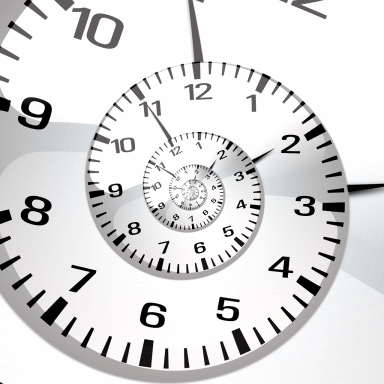
Lie: I can’t get involved because I don’t have enough time, resources or energy.
Truth: I can do everything that God calls me to do.
The sun streams through your window and you open your eyes to a new day.
For some of you, the prospect of a new day is a mix of routine and drudgery; for others of you, it’s a mind-numbing boredom and emptiness in which you try desperately to fill the time with ‘stuff to do;’ for still others, the day is a crushing busyness with pressures and stresses, an expanding task list that never ends. And depending on the day, it may be a mix of all three.
In western cultures, it tends to be the ‘task list that never ends.’ Our lives, like our homes, become a cluttered and chaotic mess, where opportunities to love abound, but where we tell ourselves that we simply cannot afford – that is, we don’t have enough – time, resources or energy to ‘get involved,’ that is, get involved in someone’s life to help, to listen, to love in a thousand possible ways.
In some ways it’s true – the cluttered and chaotic mess of our lives simply cannot take anymore ‘clutter.’ The answer is not to take on more, but to de-clutter (and not just material stuff) so that we can focus on what’s truly important. But in the midst of the chaos, we tend to shut down and go into a state of acedia (not caring); we cycle from busyness to drudgery to boredom and then back again.
But how did we get here?
What’s at the root of this?
Could it be that one huge driver spinning this cycle may be the fact that we look at life as a use of time, resources and energy? The short answer is YES. But time is not ‘usable;’ it is not a ‘resource.’
So in this series of articles I’ll unpack this foundational lie that, in turn, feeds a mass of deceptions and becomes a basic outworking of the original lie – ‘you shall be as God’ – that lie that falsely promises to empower us, but ends up ensnaring and enslaving us.
I’ll break this down into three domains of life:
- Time
- Resources
- Energy
Part 1: Time as the Abstraction of Life
How our perception and ‘use’ of time keeps us from loving and what we can do about it.
Time is obviously beyond our control, that is, no matter how hard we may try, still, time marches on at the same pace as it always has. All the natural ways that we mark the passage of time – days and nights, seasons, wake-sleep cycles (that correspond to the day-night cycles) continue on unabated. But all of the ways in which man tries to divide it with the clock – hours, minutes, seconds, and even pico-seconds – only create the false impression that man can control it by using it to sequence, schedule and synchronize, measure and manage life itself. Time now is equated with the clock.
Lewis Mumford, the brilliant historian, philosopher and writer, wrote cogently on this point:
The bells of the clock tower almost defined urban existence. Time-keeping passed into time-serving and time-accounting and time-rationing. As this took place, Eternity ceased gradually to serve as the measure and focus of human actions. . . . The clock . . . is a piece of power-machinery whose “product” is seconds and minutes: by its essential nature it dissociated time from human events and helped create the belief in an independent world of mathematically measureable sequences: the special world of science.
But the effect of the mechanical clock is more pervasive and strict: it presides over the day from the hour of rising to the hour of rest. When one thinks of the day as an abstract span of time, one does not go to bed with the chickens on a winter’s night: one invents wicks, chimneys, lamps, gaslights, electric lamps, so as to use all the hours belonging to the day. When one thinks of time, not as a sequence of experiences, but as a collection of hours, minutes, and seconds, the habits of adding time and saving time come into existence. Time took on the character of an enclosed space: it could be divided, it could be filled up, it could even be expanded by the invention of labor-saving instruments. Abstract time became the new medium of existence. Organic functions themselves were regulated by it: one ate, not upon feeling hungry, but when prompted by the clock: one slept, not when one was tired, but when the clock sanctioned it.[1]
The idea that time is sliceable, allocatable, rationable, fragments life when life is meant to be fluid. The natural divisions of time are not abrupt. They flow. For example, when does day end and night begin? At sunset? No, actually the day continues after sunset because it’s still light out. Etc, etc.
Of course, for most of us, the clock does ‘rule’ life in many unavoidable ways. For example, I will need to leave for the airport today at 3:15 pm to make sure that I don’t miss my flight. Or, to meet my daughter, who lives five miles away, it’s convenient to use the clock to avoid waiting and to reserve time for the rest of the my day. Etc, etc.

It’s important to become aware of how the clock and our fragmented perception of time (and therefore life) rules and blinds us to the opportunities to love, which do not follow the strict rule of the clock.
When time is abstracted into hours, minutes and seconds, time becomes uniform, commodified and standardized so as to be used. So life becomes and is reduced to the use of time’s standardized commodities. One minute is treated like any other. The problem is that hours, minutes and seconds are not real; they are artificial constructs, and they will ultimately lead to an artificially-constructed life.
What can we do to resist this all-pervasive perception?
Here are four things to do to break the yoke of the clock and our warped perception of time.
1 Keep your commitments negotiable/flexible
Few commitments are so iron-clad that they cannot be broken. We temporarily break time commitments for many reasons:
| pregnancy/labor | war | loss |
| trauma | sleep | medical emergency |
| homecoming | severe weather | death |
| illness | injury | holiday |
No one is so uncaring to deny a suspension of commitment for these reasons. But what about other reasons – reasons of caring and loving someone? Would the suspension of commitment be any less important to care for someone in need?[2]
Needs such as:
| discouragement | boredom | burnout |
| fatigue | disappointment | betrayal |
| anger | loneliness | despair |
This is precisely what we see in the life of Jesus. His life was nothing less than a long series of acts of caring – one ‘interruption’ after another.[3] In his life he revealed the deep love and compassion of our Father in the heavens.

Yes and even good, religious commitments must not get in the way of simple caring for individuals. For example, Jesus tells the story of the Good Samaritan. After describing how the priest and the Levite ‘passed by on the other side’– no doubt for good religious reasons – he tells how the Samaritan was different:
But a certain Samaritan, as he journeyed, came where he was. And when he saw him, he had compassion. So he went to him and bandaged his wounds, pouring on oil and wine; and he set him on his own animal, brought him to an inn, and took care of him. On the next day, when he departed, he took out two denarii, gave them to the innkeeper, and said to him, ‘Take care of him; and whatever more you spend, when I come again, I will repay you.’ — Luke 10:33–35
The Samaritan saw him and had compassion. This is the reflex that so often is missing when our lives are abstracted by the clock. Imagine how our life could be different if we, like Jesus, became aware – ‘tuned in’ – to the ‘ordinary,’ surface needs, but also even the underlying needs of individuals around us. Imagine how time would change.
2 Don’t allow empty routines to proliferate
We all have routines: morning routines, bedtime routines, work routines, eating and clean-up routines. But as I get older, I find myself relying on and succumbing to the comfort of mindless and superfluous routines — napping in the afternoon, watching the network news in the evening, eating a bowl of ice cream before bed. By themselves, these little dalliances are harmless enough, but they have a way of proliferating in the absence of direction and purpose. Empty routines proliferate until they fill every available space. And when that happens, we become robotic, hollow and cease to truly live. We must resist the insidious slide to indulge apparently benign and empty routines.
3 Be aware of seasons and rhythms
Seasons change, literally and figuratively. So in the winter we do not wear shorts and T-shirts (where I live); we don’t rake leaves in the summer; women in their ninth month of pregnancy don’t run marathons; we don’t tell jokes to someone who’s grieving.
But I’ve heard a much more literary way of putting this:
To everything there is a season,
A time for every purpose under heaven:A time to be born,
And a time to die;
A time to plant,
And a time to pluck what is planted;
A time to kill,
And a time to heal;
A time to break down,
And a time to build up;
A time to weep,
And a time to laugh;
A time to mourn,
And a time to dance;
A time to cast away stones,
And a time to gather stones;
A time to embrace,
And a time to refrain from embracing;
A time to gain,
And a time to lose;
A time to keep,
And a time to throw away;
A time to tear,
And a time to sew;
A time to keep silence,
And a time to speak;
A time to love,
And a time to hate;
A time of war,
And a time of peace. — Ecclesiastes 3:1–8
We’re called to discern the times and seasons. Jesus scolded the Pharisees for their dullness and lack of discernment.
He answered and said to them, “When it is evening you say, ‘It will be fair weather, for the sky is red’; and in the morning, ‘It will be foul weather today, for the sky is red and threatening.’ Hypocrites! You know how to discern the face of the sky, but you cannot discern the signs of the times. — Matthew 16:2–4
When we’re sensitive to the seasons and times we act in truly appropriate ways; we scratch where people are itching; and we’re more likely to meet the true needs of the people in front of us, if we’re attentive.
We can discern the seasons of:
| grieving | joblessness | depression |
| rejoicing | learning | illness |
| moving | doubt | bankruptcy |
| sleeplessness | hunger | loss |
And the fact is, nearly all of us are going through some kind of ‘season,’ though we may not recognize it as such. But if we recognize the seasons of others and simply are present to them, our words and actions can remind them that it’s a season – not a death sentence – and like all seasons, it will end.
The good news is that most of the time our presence and availability is all that is really needed; in other words, if we’re truly present, available, attentive, we may not need to say or do much, which in turn relieves us and them of well-meaning, but unintended awkwardnesses and stresses. Often what people really need underneath the presenting/surface need, is simply to be listened to and to be appreciated. And in those moments they can encounter, not only our love, but the very love of God.
4 Build and protect ‘margin’
In his book Margin, Roger Swanson, a medical doctor who saw first hand the physical toll of mental, emotional and financial stresses, makes a strong case to build what he calls ‘margin’ into our lives. He defines margin like this:
Margin is the amount allowed beyond that which is needed. It is something held in reserve for contingencies or unanticipated situations. Margin is the gap between rest and exhaustion, the space between breathing freely and suffocating. It is the leeway we once had between ourselves and our limits.
Margin is the opposite of overload. If we are overloaded we have no margin or we have negative margin. If, however, we are careful to avoid overloading, margin reappears.
Also:
Margin, the space that once existed between ourselves and our limits, was an early casualty [to progress]. When you reach the limits of your resources or abilities, you have no margin left. So as history and progress picked up speed, we hit limit after limit. Slowly, margin began to disappear. Then when exponentiality took over the controls, margin vaporized.
Now that have exceeded so many of our limits — personal, emotional, relational, physical, financial — we have no margin at all. Yet because we don’t even know what margin is, we don’t realize it is gone. We know that something is not right, but we can’t solve the puzzle beyond that. Our pain is palpable, but our assailant remains unnamed.
Much of this pain is in our relational life: to self, to others, to God. We miss margin in many areas. But we require it in our relationships. We need to get it back.
I quote at length from the book because it’s so foundational, but I hope you get the basic message.
Finances are not the only area where margin is needed, but it’s a well understood way to explain margin in other areas. Debt is negative margin; we build our savings – margin – when our income exceeds our expenses. This savings/margin is even described as a ‘cushion.’

Swanson goes into great lengths to describe the benefits of preserving margin and the detriments of leaving no margin. In terms of time, it becomes obvious: do not over-schedule or overcommit your time. Leave room for the unexpected, the unforeseen, the surprises, both positive and negative, that inevitably arise. We can do this the more we can overcome our perception of time as an abstraction of hours, minutes and seconds to use and fill, and rather start seeing time as a series of experiences of walking with the Spirit of God through life.
Swanson again (I can’t resist):
The conditions of modern-day living devour margin. If you are homeless, we direct you to a shelter. If you are penniless, we offer you food stamps. If you are breathless, we connect oxygen. But if you are marginless, we give you one more thing to do.
Marginless is being thirty minutes late to the doctor’s office because you were twenty minutes late getting out of the hairdresser’s because you were ten minutes late dropping the children off at school because the car ran out of gas two blocks from the gas station — and you forgot your purse.
Margin, on the other hand, is having breath left at the top of the staircase, money left at the end of the month, and sanity at the end of adolescence.
Marginless is the baby crying and the phone ringing at the same time; margin is Grandma taking the baby for the afternoon.
Marginless is being asked to carry a load five pounds heavier than you can lift; margin is a friend to carry half the burden.
Marginless is not having time to finish the book you’re reading on stress; margin is having the time to read it twice.
Marginless is fatigue; margin is energy.
Marginless is red ink; margin is black ink.
Marginless is hurry; margin is calm.
Marginless is anxiety; margin is security.
Marginless is culture; margin is counterculture.
Marginless is reality; margin is remedy.
Marginless is the disease of the 1990s.
Margin is its cure.
Swanson claims that this struggle to maintain margin is an unprecedented problem and is characteristic of modernity and postmodernity. He wrote this in 1992, well before social media and the smart phone. The problem is surely much greater today, nearly thirty years later.
In the next two
parts, I’ll break down the two other reasons we use to ‘not get involved’ — our
claim to a lack of resources and energy. But like time, most of us are deeply
deceived and bound by how we look at these foundations of life. But imagine
being free to flow through the seasons of life, like our Master Jesus, who
moved through his days, alert to the Father’s voice, and never failing to love
the one in front of him. This is possible when the Holy Spirit teaches and
empowers us TO GET INVOLVED.
[1] Mumford, Lewis Technics and Civilization, pgs 14–18.
[2] Of course it works the other way too – Jesus did not ‘drop everything’ to attend to Lazarus when he was told that he was sick. See John chapter 11.
[3] See for example: Luke 8:40–56